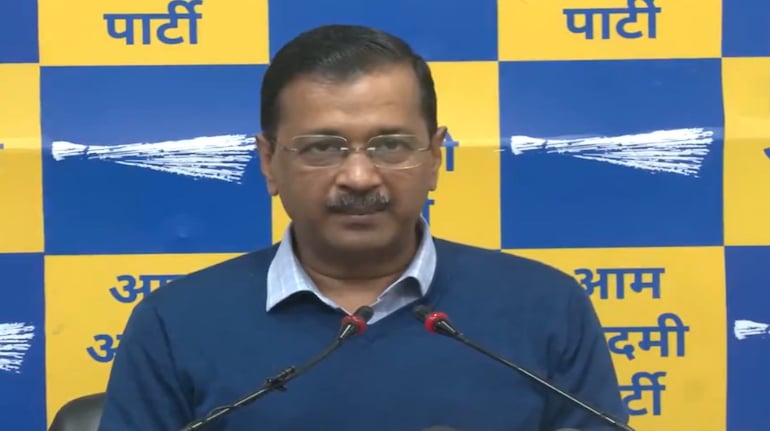



A two-judge bench of the Supreme Court (SC) ,on April 15, refused to grant any immediate relief to Delhi Chief Minister (CM) Arvind Kejriwal, in a plea challenging his arrest by the Enforcement Directorate (ED) in the liquor policy case .
The case is now likely to come up for hearing on April 29.
Hours later, on the same day, judge Kaveri Baweja of the Rouse Avenue court in Delhi extended Kejriwal’s judicial custody till April 23. Thus, Kejriwal essentially suffered two court orders on the same day from two different courts.
However, it must be kept in mind that Kejriwal chose not to contest his remand in judicial custody. He only challenged the court’s March 21 order that remanded him in ED custody. Subsequent orders were not challenged.
Two orders on the same day pertaining to the same cause of action raises questions on the nature of these two cases and how they are being heard simultaneously. Moneycontrol explains the difference between the two cases and what is the ultimate outcome, if the SC rules in Kejriwal’s favour.
Rouse Avenue proceedingsThe CM was arrested on March 21 and produced at the Rouse Avenue court on March 22.
This is in line with Article 22 of the Constitution, which says every person who is arrested must be produced before the nearest magistrate in 24 hours. Since an arrest is an exemption to the fundamental rights of an individual, there must be a good reason to do so.
When a person is produced before a magistrate, the prosecution will have to explain the reason for the person’s arrest and why they require his custody. The accused is also entitled to put forth his case and explain why the arrest is not justified.
In Kejriwal’s case, the court heard both the sides at length before remanding the CM to ED’s custody for enquiry. In the subsequent hearing on March 27, the ED told the court that it requires further custody as Kejriwal was not cooperating with the investigation.
On April 1, the ED asked the court to remand Kejriwal in judicial custody as it does not need his custody anymore. However, the ED made it clear that they may ask for his custody again, if need be. Kejriwal continues to remain in judicial custody till date. According to the ED, the investigation is at a crucial stage and the CM may tamper with it, if he is released.
The ED is required to file a charge sheet against Kejriwal within 60-90 days of his arrest, ie., March 21. If not, the CM is entitled to get a default bail. However, Kejriwal can also choose to file a bail plea in the same court and contest his further remand. This can become tricky, since obtaining a bail under the Prevention of Money Laundering Act (PMLA), 2002, is impossible unless the ‘twin conditions’ are fulfilled. The twin conditions are:
Thus, Kejriwal chose to challenge his arrest on the grounds of constitutional validity. According to Kejriwal, his arrest is against the basic structure of the Constitution.
SC proceedingsKejriwal’s arrest reached the SC, just this week after the Delhi High court rejected his plea. The CM filed a writ petition, under Articles 226 and 227 of the Constitution, in the Delhi HC immediately after his remand in ED custody.
A writ petition is filed when a person’s fundamental rights are violated. It usually questions the actions of the government in curtailing a citizen's fundamental rights.
Kejriwal mounted his attack against the ED by questioning the timing of his arrest at the ‘cusp of general elections’. He also contended that his arrest was not in compliance with the provisions of the PMLA.
According to the CM, the ED had pushed people to make statements against him, and, in return, offered tickets to contest the elections or pardoned.
The HC junked his plea and upheld the validity of his arrest. The court noted that the ED summoned him nine times over six months. However, Kejriwal neither joined the investigation nor challenged his summons. The timing of his arrest, according to the court, was his own doing. The court also concluded that the ED had collected enough material to show that the CM was actively involved in using the proceeds of the crime.
The court also came down hard on Kejriwal's comments on the accused who had approvers and said that the allegations amounted to casting aspersions on the judiciary and questioning the judicial process.
Kejriwal has now approached the apex court against this order.
Difference between the two casesThe primary difference between the case in Rouse Avenue and in the apex court is that the former is a precursor to the criminal trial that is expected to take place against Kejriwal in the liquor policy case, while the latter questions the constitutional validity of his arrest.
While the case is the Rouse Avenue Court may ultimately lead to his conviction or acquittal in the liquor policy case, going forward, the case in SC will solely focus on whether his arrest was in compliance with the constitutional processes.
However, the proceedings in the Rouse Avenue Court may not come to a complete halt, if the apex court decides to quash his arrest. The court may still have to conduct a trial in the liquor policy case to come to a conclusion on Kejriwal’s role in the alleged scam. Since the trial is yet to begin and charge sheet is yet to be filed, the apex court may not completely absolve him of his role.
Discover the latest Business News, Sensex, and Nifty updates. Obtain Personal Finance insights, tax queries, and expert opinions on Moneycontrol or download the Moneycontrol App to stay updated!
Find the best of Al News in one place, specially curated for you every weekend.
Stay on top of the latest tech trends and biggest startup news.